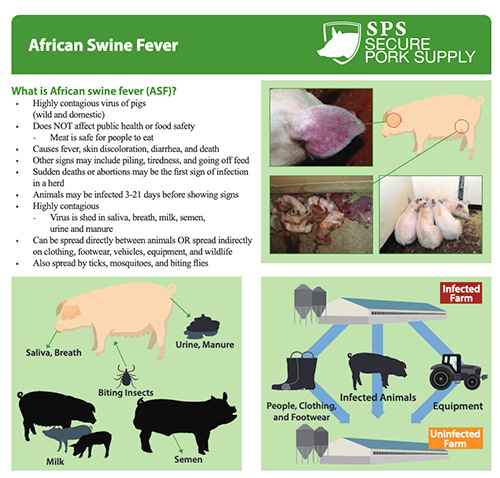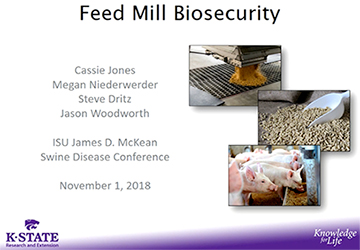Diseases and Health
Health
Swine Production Facilities
Vaccines - Swine Vaccination Considerations
Conjunctivitis in Swine - IPIC 0211
Integrated Pest Management - Management of Site Insect Levels to Minimize Carcass Impact

African Swine Fever
 African swine fever virus (ASF) is a serious, highly resistant, viral disease. Since August 2018, ASF has been rapidly spreading throughout China and Asia. U.S. swine industry organizations are working continuously on prevention and response to help keep ASF out of U.S. pig farms. ASF cannot be transmitted to humans, so it is not a public health or food safety concern.
African swine fever virus (ASF) is a serious, highly resistant, viral disease. Since August 2018, ASF has been rapidly spreading throughout China and Asia. U.S. swine industry organizations are working continuously on prevention and response to help keep ASF out of U.S. pig farms. ASF cannot be transmitted to humans, so it is not a public health or food safety concern.
Technical Fact Sheets - Center for Food Security and Public Health
Where is African Swine Fever?
ASF confirmed in the Dominican Republic and Haiti
ASF Situation Update in Asia & Pacific
Swine Health Information Center Disease Monitoring Reports
ASF and U.S. Foreign Animal Disease Preparedness
African Swine Fever Overview - Dr. Chris Rademacher
| African Swine Fever: What You Need to Know |
|
| Create an On-Farm FAD Investigation Kit for Swine | |
| Emerging Disease Communications Action Plan | |
| FAD Checklist of Priorities | |
| FAD Investigation: Producer Guidance - IDALS | |
| FAD Premises Trace-In and Trace-Out Priority Ranking for Swine | |
| Foreign Animal Disease Preparation | |
| How to Protect Pigs from African Swine Fever | |
| Know and Report the Signs of ASF | |
| National Pork Board - ASF: What Producers Need to Know | |
| Secure Pork Supply Plan | |
| Verify Your Farm's PIN here | |
| Wild Boar Populations - Dr. Ryan Brook |
ASF and Feed
Risk of African Swine Fever (ASF) virus in feed and mitigation strategies - Dr. Scott Dee
Biosecurity
Biosecurity 101 - Alex Ramirez
Biosecurity During County Fair Considerations (2025)
- CYCs, Swine Committees, and Fair Boards
- Exhibitors, Parents, and the Public
- County Fair Swine Weigh-in
Center for Food Safety and Public Health Swine Biological Risk Management
Maps and Services - Main Hog Producing States
Additional Resources
FMD is a highly contagious viral disease that primarily affects cloven-hooved livestock and wildlife. It is characterized by ulcerations and blisters on the snout, mouth and coronary bands of pigs, sheep and cattle. It is considered a foreign animal disease, since it is not currently in the United States.
Porcine Epidemic Diarrhea Virus (PEDV)
PEDV is a coronavirus that is related to transmissible gastroenteritis virus (TGEV) and causes enteric disease clinically indistinguishable from TGE.
Swine at county fair: PEDV Considerations for CYCs, Swine Committees and Fair Boards
Senecavirus A
Senecavirus A (formerly known as Seneca Valley Virus) is a non-enveloped single-stranded RNA virus of the family Picornaviridae. The ultimate concern is that clinical signs may be clinically indistinguishable from other vesicular diseases which are foreign animal diseases.
Visit the IPIC workshops page for information on upcoming FAD workshops.
Center for Food Safety and Public Health
ISU Veterinary and Production Animal Medicine
NPB Antibiotic Information Center - National Pork Board
Swine Health Information Center
Prescription and licensing FAQ from Iowa Board of Pharmacy
Veterinary Feed Directive Frequently Asked Questions to FDA
Youth Livestock Projects and Premises Identification (Prem ID) Infographic - Informational handout on the importance of Prem ID for all livestock. Youth educators, please share this infographic with your leaders, parents and 4-H members that own livestock. Additional youth resources available here.
Questions?
Chris Rademacher
Health and Disease Management

